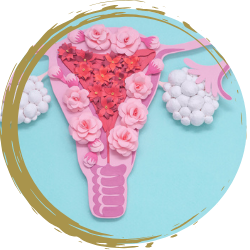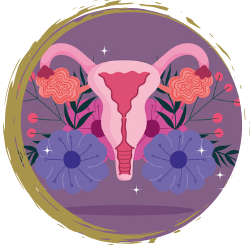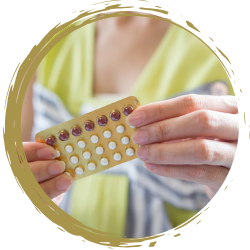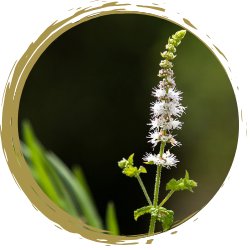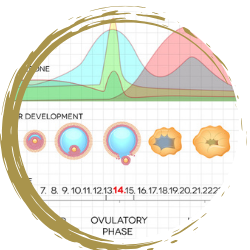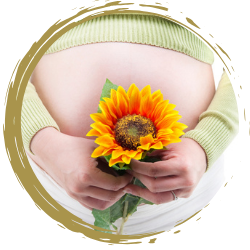PCOS Naturopath Brisbane
Are you feeling frustrated by being told to just go on the pill or to just lose weight for your PCOS condition ? Or do you have some confusion around whether or not you actually have PCOS ? Perhaps you haven’t been getting regular periods and you are not sure as to why.PCOS Naturopath
Often, when you seek help for your PCOS condition, a GP will advise you to go on the pill until you are ready to start a family at which point you will be given medication to trigger ovulation by a fertility specialist.
For some women, this is just a band aid option and doesn’t really provide a solution to naturally balance hormones nor does it address the real cause of the problem.
While losing weight can help some women with PCOS, not all PCOS conditions are due to blood sugar dysregulation and excess weight.
My job is to first help you establish the following:- Whether or not you have PCOS; What type of POCS you have or determine whether or not there may be another reason for your presenting symtoms.
Once we have established the above, the next step is to provide safe, evidence based, natural and effective solutions to support your body to find better hormonal balance.
As a Brisbane based Naturopath and Acupuncturist, I treat individuals who suffer from PCOS and need help regulating their menstrual cycles safely and naturally. This can lead to better fertility and pregnancy outcomes for those wishing to conceive.
PCOS is a condition affecting between 8 and 13 % of women of reproductive age. The most recent criteria (Rotterdam 2003) for a PCOS diagnosis includes:
The presence of multiple, immature follicles on the ovaries. Follicles are fluid like sacs that normally mature and become dominant in the first half of the cycle (the follicular phase). At the midpoint of the cycle (ovulation phase) the dominant follicle will release an egg so that it can be fertilised. This process is somewhat disrupted in women with PCOS.
Ovulation abnormalities such as delayed or absence of ovulation causing delayed or absence of menstruation. Due to the disruption of follicle maturation, ovulation can often be delayed which then lengthens out the menstrual cycle. The normal length of a menstrual cycle is between 26 and 32 days however this can be considerably longer for women with PCOS.
The presence of higher than normal androgen levels. Androgens are hormones made in the ovaries in women and in the testes in men. The levels of androgens in women are much lower than they are in men. Testosterone is one example of an androgen. In the case of PCOS however, 60 % of those with the condition are said to have high levels of androgens which can cause a number of complications.
Some other features of PCOS may include: facial hair, acne and obesity, insulin resistance.
Insulin resistance is a pre-type diabetic like state where the body has trouble handling and utilising glucose in the blood. As a result, the pancreas makes more insulin causing blood glucose and blood insulin levels to rise. This may often lead to weight gain and obesity. Insulin Resistance can be a factor in 65 % of women diagnosed with PCOS.
An elevated AMH: AMH which stands for Anti Mullerian Hormone is now an important part of the PCOS diagnosis. A high AMH indicates a higher than normal number of immature follicles in the ovaries which is often seen in women with PCOS.
If you have irregular cycles or infrequent periods does this mean you may have PCOS ?
The short answer to this question is NO.
There can be a number of reasons as to why a woman may have irregular and long cycles or infrequent periods. This is known medically as Secondary Amenorrhea. Officially, this is when a period has not occurred for greater than 3 months or when there have been irregular periods for greater than 6 months when previous to this a regular menstrual cycle was present.
Some of the causes of secondary amenorrhea include:
Pregnancy: Sometimes this obvious cause of no periods can be accidentally overlooked !
High prolactin: Prolactin is a hormone that is involved in the development of breasts in women as well as the production of milk during pregnancy and breast feeding. When this hormone is found to be too high, it can cause a disruption to the menstrual cycle.
Premature Ovarian Failure: This is essentially early onset menopause due to the ovaries prematurely ‘shutting up shop’. The causes of Premature Ovarian Failure are varied.
Functional Hypothalmic Amenorrhea: Your periods can become infrequent or stop altogether when the part of brain that controls the hormones and ovaries is not functioning correctly. This is referred to as the Hypothalmic-Pituitary-Ovarian axis which if affected can cause a delay or absence of the menstrual period. Some of the causes of this include low caloric intake, excess exercising and/or stress.
and
PCOS as described above.
How to know if you have PCOS?
If you have irregular cycles and your hormone blood tests are showing a certain pattern such as elevated androgens and/or blood sugar dysregulation and/or and an elevation of leutenising hormone (LH) relative to Follicle Stimulating Hormone (FSH) then there is a chance you may have PCOS. For an official diagnosis however you will need to see your GP who may refer you for a trans vaginal ultrasound to determine whether or not your ovaries are showing a poly cystic presentation. You may or may not be referred to a gynecologist by your GP.
If you have not been diagnosed with PCOS and you have irregular periods, your hormone blood tests may indicate other reasons for the delay in ovulation. This is something we will explore together and treat based on the causative factors.
It is not essential that you receive a diagnosis of PCOS before commencing treatment with me as your signs, symptoms and blood test profile will determine the type of naturopathic and/or Acupuncture treatment protocol that is best suited to you.
PCOS is a metabolic disorder not just a hormonal one
Many women with PCOS also have obesity or insulin resistance which can also affect fertility. Insulin resistance is similar to a pre-diabetic state where insulin levels and glucose levels in the blood are elevated. There can often but not always be weight gain in the case of insulin resistance.
Elevated blood glucose and insulin can cause an increase in androgens as well as an increase in the Leutenising Hormone (LH) which can cause a delay in ovulation and a long menstrual cycle.
Weight loss is a recommended treatment for overweight/insulin resistant women with PCOS who are trying to conceive. In particular, reducing starchy, high glycemic foods such as white bread, pastries, biscuits, potatoes etc is recommended as well as other dietary strategies and herbal/nutrient support which will be discussed at your treatment.
Metformin is a drug that doctors may prescribe for Insulin Resistance and Type 2 Diabetes that they also may prescribe for PCOS due to the metabolic link. Metformin has been found to increase ovulation rates. The jury however, is out as to whether or not it increases pregnancy and live birth rates.
There is a type of PCOS that is not related to insulin resistance that is referred to as Adrenal PCOS. Again, this can be ascertained through hormone testing and is something that I will help you identify and treat.
What is the conventional treatment for PCOS ?
One of the most commonly used drugs for PCOS is Metformin as discussed above. Metformin is the drug that is also used for Type 2 diabetics. The reason for this is that PCOS is often, not just a hormonal disorder but a metabolic one too. It has been noted that glucose and insulin levels can often be elevated in PCOS which can further exacerbate the symptoms. This is why as part of the treatment it is important to address blood sugars and to adhere to a diet that is low in foods that have a high glycemic index such as bread, pasta, potatoes, pastries, biscuits etc.
For women with PCOS who are trying to conceive, drugs such as Clomid and Letrozole will be given by their fertility specialist. These are designed to promote ovulation. Whilst on Clomid or Letrozole, your fertility specialist may monitor the dominant follicle closely and then administer a trigger shot/ drug known as Ovidrel. This ensures that there is a final release of the egg.
Interestingly there is a study that has looked at the use of Clomid in conjunction with a medicinal herb called Cimicifuga Racemosa (Black Cohosh). In this study, an increase in pregnancy rates, progesterone levels, and endometrial thickness was observed as well as quicker follicle maturation.
How can a Naturopath help with PCOS ?
One of the most important natural treatments for PCOS is diet, especially one that is low in sugar and simple carbohydrates and replete in healthy protein, good quality fats and a vast variety of vegetables. This is especially important for women with PCOS who present with insulin resistance.
For some, weight loss and blood sugar regulation is key for establishing a healthy, regular and timely ovulation and menstruation.
The herbal medicines and supplements used for PCOS will of course depend on your individual presentation and hormonal profile. Some of the natural medicinals that may be used in your treatment include:
Herbal medicines which are shown to lower androgens such as Peony (Paeonia Lacteforia) and Licorice (Glycyrrhiza Glabra). These herbs are also know to lower prolactin levels if they are found to be elevated.
Spearmint tea has also been shown to lower elevated androgens in women with PCOS.
One of the key herbal medicines which is shown to reduce Leutenising Hormone (LH) is Black Cohosh (Cimicifuga Racemosa). LH can often be elevated in women with PCOS causing a delay in ovulation.
A key nutrient that can help with healthy oestrogen detoxification if this is something that is of concern includes broccoli sprout powder. This can be coupled with the herb Rosemary (Rosmarinus officinalis) which also has a role in healthy oestrogen detoxification.
Remedies which help to balance blood sugar and insulin levels such as the herb, Cinnamon and the nutrients Chromium and Myo-Inositol may also be useful in the treatment of PCOS.
Why does a naturopath want to test my hormones in regards to PCOS?
PCOS is regarded not only as a hormonal condition but also as a metabolic condition affecting glucose, insulin and cholesterol. First, however, let’s look at some of the hormones that might be affected with PCOS.
Androgens: These are hormones that are made in the testes in men and in the ovaries in women in lesser amounts. An example of an androgen is testosterone. Androgens are often found to be elevated in women with PCOS.
Leutenising Hormone: This is a hormone that triggers ovulation when it reaches its peak. It is also responsible for the development of the corpus luteum which is what is left over after the dominant egg is released at ovulation. The corpus luteum is responsible for the healthy growth of the uterus and the production of progesterone. Elevated leutenising hormone is a common finding in PCOS that can be driven by a metabolic imbalance such as elevated blood glucose and insulin.
Prolactin: This is a hormone that governs breast development and the production of milk for breast feeding. Prolactin can be elevated in PCOS
Oestrogen: Oestrogen levels in PCOS patients can be either low or high depending on the person.
Thyroid: It is always worth doing a thyroid assessment as the thyroid can play a role in the PCOS picture. A thyroid panel may show a sluggish thyroid
AMH: Anti Mullerian Hormone is often but not always elevated in PCOS
It is important when treating PCOS and other hormonal or reproductive presentations, that a full hormone panel is run to determine the underlying hormonal cause of the problem. This is a very tailored and specific approach to the treatment of PCOS and other hormonal conditions. The hormones that are required to be assessed will be discussed at your first appointment.
What will the Naturopathy treatment entail for someone with PCOS ?
Your first appointment will involve an in depth chat about your current and past health.
All systems will be addressed such as your nervous, digestion, reproductive, immune system etc.
Any recent blood tests you have done with a GP or specialist will be reviewed and commented on.
If no testing has been previously done, you will be instructed as to which testing will be needed.
If you have done some basic testing with your doctor, further testing most likely will be recommended to ascertain a more thorough understanding of your specific symptom picture. Often these will be in the form of blood tests though sometimes I may request some functional testing such as gut microbiome assessments, food intolerance testing and testing for gene mutations.
Once all information has been gathered, a tailored treatment plan will be devised including the prescription of herbal medicines, nutritional medicines, dietary therapy and life style modifications.
Acupuncture may form part of your treatment plan as well if deemed applicable.
In summary, normally the first couple of sessions will be information gathering, testing and setting up a treatment plan. From hereon, monthly sessions will be recommended where a review takes place and treatments adjustments are made. For those who wish to include Acupuncture as part of their treatment, fortnightly sessions are recommended.
How can Acupuncture help with PCOS?
PCOS in Chinese Medicine terms can be due to stagnation of Qi, phlegm and damp and general Yang deficiency which in lay men’s terms mean a lack of warmth in the body causing bodily systems to be sluggish and inefficient.
There are numerous studies exploring the role of Acupuncture in the treatment of PCOS with pleasing results. One systematic review and meta analysis found that Acupuncture helped to regulate the menstrual cycle in women and helped to reduce LH hormone which can often be elevated in women with PCOS.
Essentially, any Acupuncture treatment for PCOS will be very individualised based on pulse, tongue and abdominal examination. The goal of the treatment is to support the body to ovulate, to assist in the management of blood sugar regulation as well as any other findings noted.
It has been postulated that Acupuncture can influence the production of β-endorphin , which can then impact gonadotropin-releasing hormone secretion. This in turn can positively influence ovulation and menstruation.
Both Naturopathy and Acupuncture aim to identify the drivers of PCOS which will be different for each person presenting in clinic. The best place to start from a Naturopathic perspective is with a blood test that can provide vital clues about what is driving your condition. For women who have a somewhat regular menstruation, day 2 of your menstrual cycle is the best time to test many of the hormones. These can be done through a simple blood test. Hormones such as Oestradiol, Follicle Stimulating Hormone (FSH), Leutenising Hormone (LH), Prolactin, DHEAs, Testosterone and Androstenodione are some of the hormones tested. In conjunction with this a metabolic assessment is done whereby blood tests such as Fasting Insulin and Glucose are run to determine whether you have insulin resistance or problems managing blood sugar levels that may be contributing to your PCOS symptoms.
As well as this, a full case history is taken and any other general blood test results are taken into consideration.
Going through any contributing factors related to life style such as diet, exercise and stress is also necessary when treating PCOS.
How can PCOS effect fertility?
74 % of women with PCOS are said to experience problems with fertility. This is due to ovulation and menstrual irregularities, uterine bleeding dysfunctions as well as absence of or infrequent periods.
21 % of women with PCOS who do menstruate regularly are thought to have cycles where ovulation does not occur.
For those who have an irregular or long cycle, ovulation will not occur as frequently as women who have a regular 28 (give or take) day cycle. This then naturally reduces the opportunities for conception to occur.
Head over to my blog page to read more about PCOS and Fertility.
How can PCOS affect pregnancy ?
Pregnant women who have PCOS are said to have a greater risk of spontaneous abortion, gestational diabetes and pregnancy induced hypertension (high blood pressure).
How long before I get pregnant if I have PCOS?
If you have been diagnosed with PCOS and your cycle is quite long or irregular, it may take between 6 to 12 months of Acupuncture and Naturopathy treatments to establish a regular and more ideal cycle length before becoming pregnant.
If you have PCOS and have a regular cycle, and your goal is to get pregnant, three to six months of working with me would be a rather realistic timeline.
Fortnightly visits are usually what I recommend for patients with PCOS wishing to conceive or wishing to regulate their cycle.
Some patients whom I treat may already be seeing a fertility specialist to induce ovulation. These clients will often have Acupuncture as an adjunct to their ovulation induction treatments.
I would however always encourage a client who has PCOS wishing to do ovulation induction with a fertility specialist to do some of the preliminary work first. This would include carrying out a hormonal and metabolic assessment, treating any findings with natural medicines, implementing dietary changes if needed and regular Acupuncture.
About Me
To be honest, it was confusion and frustration around mainstream and standard medical treatment options that lead me to become a Naturopath, Nutritionist, Herbal Medicine practitioner, Acupuncturist and Chinese Medicine practitioner in the first place….For most of my earlier life and especially in my 20’s, I had a health condition where the solutions medical professionals were offering, felt more ‘band aid’ like and did not seem to consider the root of the problem. I was also a little concerned about the side effects and long term risks of the medication that was being offered to me…...so it was this life experience that has led me to help others who are looking for solutions to their health challenges in a thorough, holistic and safe way.
I have been working in the natural health space for 28 years now. Before completing my Bachelor of Health Science in Acupuncture and then later, an Advanced Diploma in Naturopathy, Nutrition and Herbal Medicine, I was a body worker practicing various styles of massage. I am APRAH registered and a member of the Australian Acupuncture and Chinese Medicine Association (AACMA). I am also a member of the Australian Traditional Medicine Society (ATMS) and the Australian Branch of Toyohari Association (ABTA).
Over the years working in the natural medicine space, I have devoted much of my time undergoing post graduate training and professional development in the area of women’s health including PCOS, Endometriosis, Fertility, Pregnancy and Menopause from both a Naturopathic and Chinese Medicine perspective…..When appropriate, I will use an integrative approach to your PCOS health concerns for best results.
If you are interested in delving deeper into your PCOS condition or want some clarification as to whether or not you have PCOS or other hormone issues, I invite you to work with me. You can do this either in person in my Brisbane south side clinic or alternatively online via Zoom.
Either place, I look forward to working with you soon.
Mx


